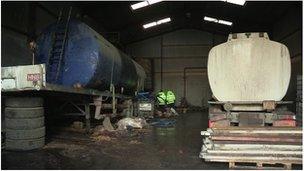No-one jailed for fuel smuggling 'in decade'
- Published

Custom officers said the shed had been built with laundering diesel as its purpose
No-one has gone to jail for fuel smuggling in Northern Ireland in the last decade, a senior customs officer has said.
John Whiting, assistant director of criminal investigation for HMRC, was speaking after a diesel laundering plant was found in County Armagh.
He said that time behind bars would be a "disincentive" to fuel smugglers.
"That is an issue we have raised with the Northern Ireland Affairs Committee as a matter of concern," he said.
"There are a number of discussions taking place, we are aware that the Lord Chief Justice has prepared some sentencing guidelines, we are also engaged with the Department of Justice in a review of comparative sentencing with England and Wales compared to Northern Ireland.
"One of the things that we have been concerned about - that we have no right of appeal in respect of unduly lenient sentences - the Department of Justice is consulting about a new piece of legislation on that issue.
"They are being sentenced, but with suspended sentences. They are getting imprisonment but it is suspended.
"In England and Wales the sentence is actually custodial, people are going to jail, clearly there is a disincentive to the crime if you are going to have your liberty removed and that disincentive has not existed in Northern Ireland."
In a raid on Wednesday, officers removed 14 tonnes of toxic waste from an isolated shed near the village of Jonesborough in south Armagh.
They discovered large underground tanks being used to launder green diesel.
Mr Whiting said that it was one of the most sophisticated plants ever found in Northern Ireland and had now been dismantled.
He said the plant was capable of producing 25m litres of illicit fuel, evading over £18m in taxes and duty a year.
"The level of sophistication was astounding," he said.
"It appears to us that the premises had been built solely for the purposes of laundering fuel.
"We believe that the underground tanks were installed at the time it was built."
- Published30 January 2013